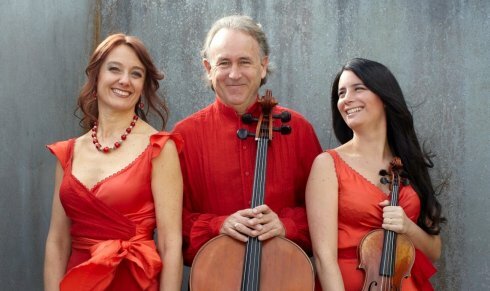NZ Chamber Soloists (2021)
The NZ Chamber Soloists are firm favourites of Tauranga Musica concert-goers having played for the Society many times previously. The three outstanding musicians are all members of the teaching faculty at University of Waikato, Katherine being head of piano, James head of cello and Lara lecturer in violin. They are solo recitalists and have played with many orchestras in NZ and internationally and have toured as a trio to several countries where they played to appreciative audiences.For this concert they are thrilled to be joined by violinist Dimitri Atanssov, an original member of the Trio.
Dimitri Atanssov Press Image
Extended Programme Notes
NZ Chamber Soloists Concert Review
View Programme Notes
Sponsored by BDO
Review of NZ Chamber Soloists:
The NZ Chamber Soloists presented an eclectic programme of works at the Baycourt Exhibition Space on Sunday afternoon.
The trio, comprised of Katherine Austin (piano), Laura Hall (violin), and James Tennant (cello), dedicated the first half of their programme to women composers which is a welcome and overdue diversion from programmes which typically feature the usual pale, male and stale cast of characters. Bravo!
The trio opened the first half of their concert with a work by New Zealand composer, Jenny McLeod. Dark Bright Night is clearly a work which challenges not only the skill of the musicians who play it, but also the ears of those who encounter it. The work, relying heavily upon the theoretical concept of the tone clock, began with a particularly gentle and delicate dialogue between piano and cello. It soon erupted, however, into something much more amazing and chaotic. McLeod forces her musicians to the absolute brink of their abilities and skills, exhaustively exploiting each of them. From her use of harmonics, to pizzicati, to even percussion, McLeod exploits it all. This work probably requires further unpacking and the erection of more scaffolding (context and explanation) to ensure maximum enjoyment and understanding of audience members. The recitation of a poem by the composer from a mobile phone before it is played does not suffice. As a new work, only time and popular opinion will decide its merit and fate.
Rebecca Clarke’s (1886 – 1979) Piano Trio in E Flat, the performance of which was touchinigly dedicated to the outstanding life-long musical contributions of Tauranga’s own Musical Wonder Woman, Bev Read, rounded out the programme’s first half. Composed in 1921, Clarke’s Trio is a wonderfully cohesive work, reminiscent of its time. The ravages and carnage of the First World War and the uneasiness and fragility of peace are all thoroughly explored and laid bare.
The opening Moderato, and its unison strings accompanied by a passionate piano part, crescendos and crescendos, creating a sense of sparsity that permeates with a strange foreboding sense of something ominous to come. Tennant closed this opening movement with a particularly stirring and passionate passage, punctuated by occasional trumpet calls from Austin and Hall.
The Andante began with an exquisite melancholy theme introduced by Hall who was seemingly capable of creating the illusion of playing this haunting theme from a distance, as if in another room. Austin’s exquisitely beautiful and tender tone soothed, as the two string players arpeggiated softly in the background.
The final Allegro began something like an energetic English country dance of bygone times. The dance was a interrupted from time to time and was never allowed to last. Trumpet calls again featured as a means to break the tension throughout before the Hall and Tennant returned to unison string playing before a strong and impressive fanfare to close.
For the Piano Quartet in C Minor, Op. 60 by Johannes Brahms, the Trio became a Quartet and were joined by Dimitri Atanasasov on violin, while Hall capably made the switch to the viola. Not only is the Brahms Quartet a pinnacle of chamber music for strings and piano, but it is also a work, when performed well, tells the story of love and rejection. And never have I heard this work performed so well.
The opening Allegro brims with all the angst and frustration one might expect from a 22 year old whose romantic advances have been flatly rejected. The players captured perfectly this tumultousness through exquisitely balanced intonation in the opening introduction and ferociously rhythmic playing through the unison passages. Austin’s tenderness of touch was, in and of itself, heartbreaking in this opening movement.
Brahms’ Scherzo is an intense and chaotic release of anguish. Ever the master manipulator of harmony, Brahms manages to remain almost exclusively in his chosen minor key, with the sole exception of a surprising explosive climax to the major at the very last moment.
The Andante opened with a beautiful and impassioned introduction by Tennant, adding the other players over the course of time. The players beautifully capture the contemplations of an older, more mature (and now romantically experienced) Brahms whose passions have clearly cooled. While still obviously heaving with romantic sentiment, his tone was no longer torrid.
The final Allegro was a fiery resolution which featured some terribly exciting work on the piano by Austin and a lot of unison string playing. A truly satisfying end to the woes of Brahms’ complicated love life.
- Chalium Poppy, 31 May 2021
Previous concert
Next concert
